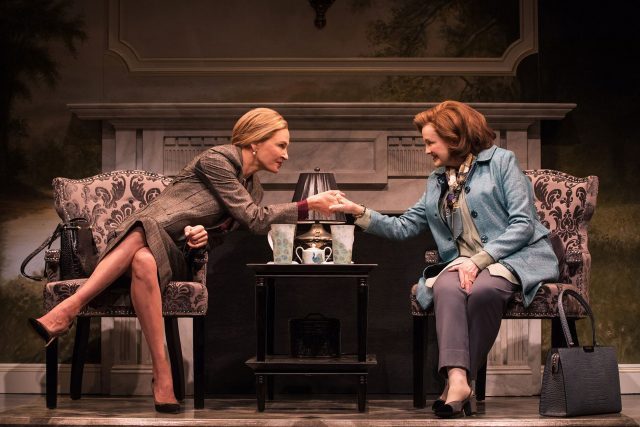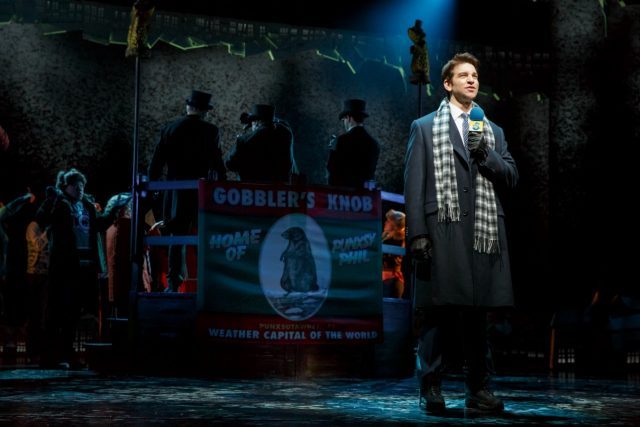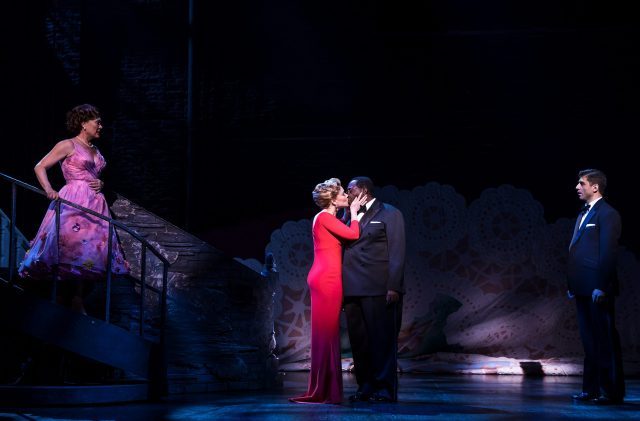
Gerald (Keegan-Michael Key), Norm (Jeremy Shamos), Corky (Amy Schumer), and Laura (Laura Benanti) prepare for quite an evening in absurdist one-act comedy (photo by Matthew Murphy)
Booth Theatre
222 West 45th St. between Broadway & Eighth Ave.
Tuesday – Sunday through January 21, $59 – $169
www.meteoronbroadway.com
Steve Martin’s Meteor Shower is one of the funniest disappointing plays I’ve ever seen. The eighty-minute trifle is like an insane, extremely sexual Carol Burnett sketch told multiple times from different points of view, growing more and more absurdist and ridiculous with each iteration. Yet even as the setups get more and more annoying and unbelievable, I couldn’t stop laughing, primarily at Amy Schumer and Jeremy Shamos as Corky and Norm, a cutesy, quirky married couple who have invited over Santa Barbarians — er, Santa Barbarans — Laura (Laura Benanti) and Gerald (Keegan-Michael Key) to get an unobstructed, clear view of the Perseid meteor shower. It’s August 1993, and Corky and Norm live in a fashionable, daintily outfitted beach house in Ojai, California. (The rotating suburban set is by Tony winner Beowulf Boritt.) Laura and Gerald are a rather odd pair; she is a seductress who flaunts what she’s got, while he is a loudmouthed know-it-all prone to bold, questionable proclamations. “The brightness of the sun overwhelms the dimness of the meteor. Like the way some personalities overwhelm the lesser lights,” he bloviates, less-than-subtly referring to the dominance he and Laura lord over Corky and Norm. “I flew in a plane once to follow a solar eclipse,” Gerald boasts, to which Corky notes, “That must have been beautiful.” Gerald responds, “Beautiful? Powerful. To block out the sun? To be a man and block out the sun longer than nature intended? I defeated the sun. I thought, ‘I’m something to contend with.’” Gerald does indeed prove to be something to contend with as slightly altered variations of the same scene — Corky and Norm prepare, Laura and Gerald arrive, the four of them engage in strange conversation, then they get ready to see the meteor shower — repeat over and over again, as displays of social and sexual supremacy go haywire. There’s talk of eggplant, mountain bugs, fashion, the Coopers, infidelity, obesity, cannibalism, breaking hugs, and other random topics that loop in from way out in left field, for better or worse.

Amy Schumer makes a charming debut in Steve Martin’s Meteor Shower (photo by Matthew Murphy)
Meteor Shower is an idea that has been percolating inside Martin’s (Bright Star, Picasso at the Lapin Agile) head since the mid-1990s, but it still feels only half-brewed. In her Broadway debut, Schumer (Trainwreck, Inside Amy Schumer) reveals a sweet vulnerability and a charming confidence in how she uses her body, from holding hands to making a drink to sitting on the couch. Tony nominee Shamos (Clybourne Park, If I Forget), one of Broadway’s most dependable actors, has a field day as the somewhat repressive Norm, adeptly moving from straight man to funnyman; he joined the cast just three weeks before previews began, replacing Alan Tudyk, who left over creative differences. Tony winner Benanti (Into the Woods, Gypsy) is a little too comfortable as Laura, though she’s not afraid to try anything for a laugh, but Key (Key and Peele, Don’t Think Twice) is way too over-the-top as the blustery Gerald, almost as if he’s acting in another play. (The original cast at San Diego’s Old Globe in the summer of 2016 featured Jenna Fischer as Corky, Greg Germann as Norm, Alex Henrikson as Laura, and Josh Stamberg as Gerald; that version clocked in at 105 minutes, so there have been significant cuts since then.) Legendary director Jerry Zaks (Guys and Dolls, Six Degrees of Separation) can’t quite bring it all together in any kind of cohesive form; the story goes all over the place, especially after a meteor plunges to Earth. There’s no stopping the fireball barrage of very funny jokes, both erudite and lowbrow, from Mr. Martin, but Meteor Shower ends up being all punch line, no setup, fizzling out as a Broadway production.









